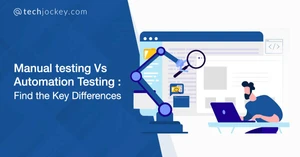What Is Testing Automation Software?
Testing automation software helps developers to automatically test the working efficiency of web applications, software products, APIs, and mobile applications before production. With it, they can automate tasks like running application testing, generating test scripts, and analyzing the test results. It can be used in testing both functional and non-functional aspects of any application. Further, after running the tests, it generates reports that highlight the bugs and vulnerabilities detected in the tested product.
Who Uses Testing Automation Software?
Automated software testing tools can be used by the following group of people for the successful testing of web applications and software products.
- Developer Team: This team uses this tool to create test scripts and run automated tests on their products. Further, it can also be used to run multiple tests simultaneously to test different product features.
- Quality Assurance Team: The quality assurance team uses software testing tools to generate reports of testing results. It analyzes these reports to identify bugs and vulnerabilities so that they can be fixed as soon as possible.
Why Use Testing Automation Software?
There are several reasons why you should use testing automaton software for product testing.
- Run automated software tests repeatedly throughout the product development lifecycle
- Find and fix vulnerabilities in the product at the earliest stage possible
- Run multiple tests simultaneously and save time
- Create and edit tests scripts to be executed on the software product.
- Eliminate the chances of data errors that usually happens with manual testing.
Key Features of Testing Automation Software
Testing automation software can help in creating and running test scripts to check whether the tested product is meeting the production requirements. For that purpose, it offers the following features:
- Test Feedback: Software testing tools provide a report when the product testing is completed. This lists down all the bugs and vulnerabilities that need to be resolved for the smooth functioning of that product.
- Test History: Testing automation software maintains a history of testing logs that can be used in future for references. Testers and developers can use this data for identifying the solutions for recurring bugs issues.
- Custom Parameters: With this feature, you can easily customize the parameters of your product testing. This will help you in testing the exact qualities of any software that you need to focus upon.
- Security Testing: Under this, you can evaluate software security and identify vulnerabilities that might expose confidential data to hackers.
- Requirements Testing: With this, you can test and check whether the final version meets the desired performance and quality.
- Parallel execution: This feature lets you run multiple tests of software on different devices, browsers, and environments simultaneously.
Benefits of Testing Automation Software
Automated software testing tools can help organizations in a plenty of ways, such as:
- Improves Collaboration: Automated software testing tools come with real-time collaboration features that help to keep developers, managers, and stakeholders on the same page. Therefore, helping you to share updates regarding product testing easily with other members and stakeholders from the single solution.
- Cost Effective: Automated testing software can help you save money as it can run multiple tests in a day compared to manual testing where limited tests are conducted in the given time frame. Moreover, the organization can hire only a few testers that set instructions in the software to complete multiple tests automatically in a short span.
- Increased Test Coverage: The tool can help in increasing the test coverage as multiple tests can be conducted on a single software simultaneously. Further, you can also check multiple features of any software simultaneously that helps in increasing the test coverage.
- Provides Insights on Product Failure: Software testing tools can provide developers with valuable insights for the reasons behind testing failures. The software will analyze all the test results and generate reports highlighting the reasons for detected vulnerabilities to resolve them.
- Creates Reusable Workflow: With these tools, you can create and save reusable workflows that you can use multiple times while testing other software products. This will help you save time while testing the application.
Testing Automation Software Trends
IoT technology is on the rise these days and will significantly impact the software testing tools. The data shared to IoT devices is delivered through the APIs present in the software. Therefore, it will become important to conduct API testing to ensure that all IoT-enabled devices are managed properly through APIs offered by a software.
Geolocation helps in identifying the physical location of a person in real-time, many applications such as HR software offer this feature to track the employee's location. Therefore, many software testing tools enable users to test the geolocation feature of the required software to ensure that it accurately tracks the person’s location.
Comparison of Top Testing Automation Software

Factors to Consider While Buying Testing Automation Software
To choose the right Testing Automation Software consider the following factors:
- Supported Platforms: The application testing tools should support testing different web applications, APIs, mobile applications, etc.
- Budget Friendly: Make sure the automation tool you are planning to buy fits in your budget and provides all the testing features you want.
- Supported Languages: Choose web automation tools that support different programming languages to write test scripts such as Java, Python, Ruby, JavaScript, etc.
- Tests Reports: The availability of this feature would help you to analyze the test results and identify vulnerabilities present in the tested product.
- No-Code Editor: With the no-code editor, you can easily edit the test scripts without any code.




















